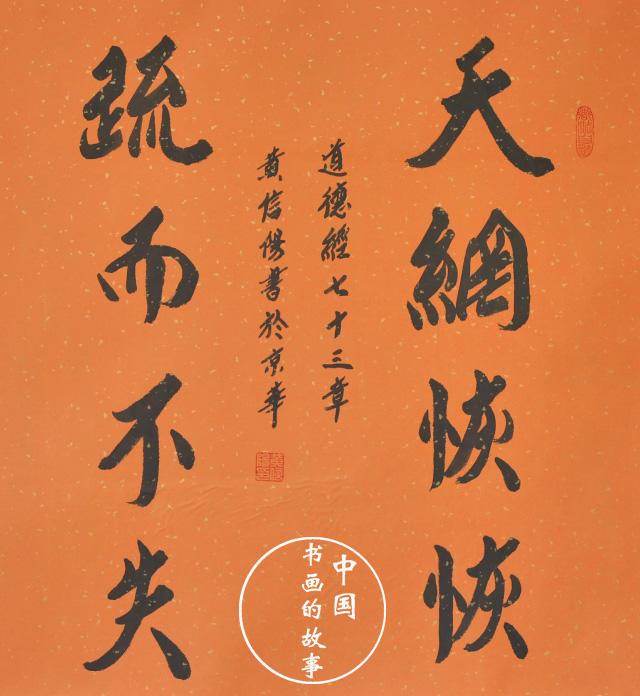
勇於敢則殺。
勇於不敢則活。
此兩者或利或害。
天之所惡。
孰知其故。
是以聖人猶難之。
天之道。
不爭而善勝。
不言而善應。
不召而自來。
繟然而善謀。
天網恢恢。
疏而不失。
道德經 [王弼,Wáng Bì; * 226; † 249),Fusi (辅嗣)]
| 73 | 道德經: | 此兩者,或利或害。 天之所惡,孰知其故?是以聖人猶難之。 天之道,不爭而善勝,不言而善應,不召而自來,繟然而善謀。 天網恢恢,踈而不失。     |
| Dao De Jing: |
(Allowing men to take their course)
He whose boldness appears in his daring (to do wrong, in defiance of the laws) is put to death; he whose boldness appears in his not daring (to do so) lives on. Of these two cases, the one appears to be advantageous, and the other to be injurious. But
When Heaven's anger smites a man,
Who the cause shall truly scan?
On this account, the sage feels a difficulty (as to what to do in the former case).
It is the way of Heaven not to strive, and yet it skilfully overcomes; not to speak, and yet it is skilful in (obtaining a reply); does not call, and yet men come to it of themselves. Its demonstrations are quiet, and yet its plans are skilful and effective. The meshes of the net of Heaven are large; far apart, but letting nothing escape.
|

天网恢恢,疏而不失。(春秋(老子·七十三章)
Dao De Jing Chapter 73 - Seddon
Jan 24 at 1:45 AM
73
He who is courageous in taking action is soon killed.
He who is courageous in remaining passive keeps his life.
Of the two kinds of courage, one is harmful and the other is advantageous.
Who knows why Heaven disapproves of one kind?
Even the Sage is unsure how to answer this.
The Way of Heaven accomplishes without competing;
Without declaring its will it receives a response;
Without summoning, things come to it of their own accord;
It accomplishes slowly, with well-laid plans.
The net of Heaven is vast,
And though its mesh is very wide,
Nothing can slip through.

勇于敢则杀,勇于不敢则活。此两者,或利或害。天之所恶,孰知其故?是以圣人犹难之。天之道,不争而善胜,不应而善应,不召而自来,繟然而善谋。天网恢恢,疏而不失。
——老子《道德经》 七十三章

【译文】
勇于坚强就会死,勇于柔弱就可以活,这两种勇的结果,有的得利,有的受害。天所厌恶的,谁知道是什么缘故?有道的圣人也难以解说明白。自然的规律是,不斗争而善于取胜;不言语而善于应承;不召唤而自动到来,坦然而善于安排筹划。自然的范围,宽广无边,虽然宽疏但并不漏失。

【哲理导读】
本章主要讲人生哲学。第一层意思是柔弱胜坚强,第二层意思是天道自然。这两层意思之间是相互沟通的。老子认为,两种不同的勇,会产生两种不同的结果,一则遭害,一则存活。“勇于敢则杀,勇于不敢则活”。自然界的万事万物只要依照自然的规律变化和发展,都会有好的结果,不会有什么漏失。
在这里,老子讲了自然无为的人生哲学,细细读来,颇能启迪人的心灵。
河上公-老子道德經
〈以生者爲有精神託空虛喜清淨飲食不節忽道念色邪僻滿腹爲伐本厭神厭於艷反〉夫唯不厭是
以不厭〈夫唯獨不厭精神之人洗心濯垢恬泊無欲則精神居之不厭也〉是以聖人自
知〈自知己之得失〉不自見〈不自顯見德美於外藏之於內見賢遍反〉自愛〈自愛其身以保精氣〉
〈也〉不自貴〈不自貴高榮名於世〉故去彼取此〈去彼自見自貴取此自知自愛去羌呂反〉
任為第七十三
勇於敢則殺〈勇敢有為即殺身也〉勇於不敢則活〈勇於不敢有為則活〉
〈其身〉此兩者〈謂敢與不敢也〉或利或害〈活身為利殺身為害〉天之所惡〈惡有〉
〈為也惡烏路反〉孰知其故〈誰能知天意之故而不犯〉是以聖人猶難之〈言聖〉
〈人之明德猶難於勇敢況無聖人之德而欲行之乎難乃旦反〉天之道不爭而善勝〈天不〉
〈與人爭貴賤而人自畏之〉不言而善應〈天不言萬物自動應以時〉不召而自來






No comments:
Post a Comment